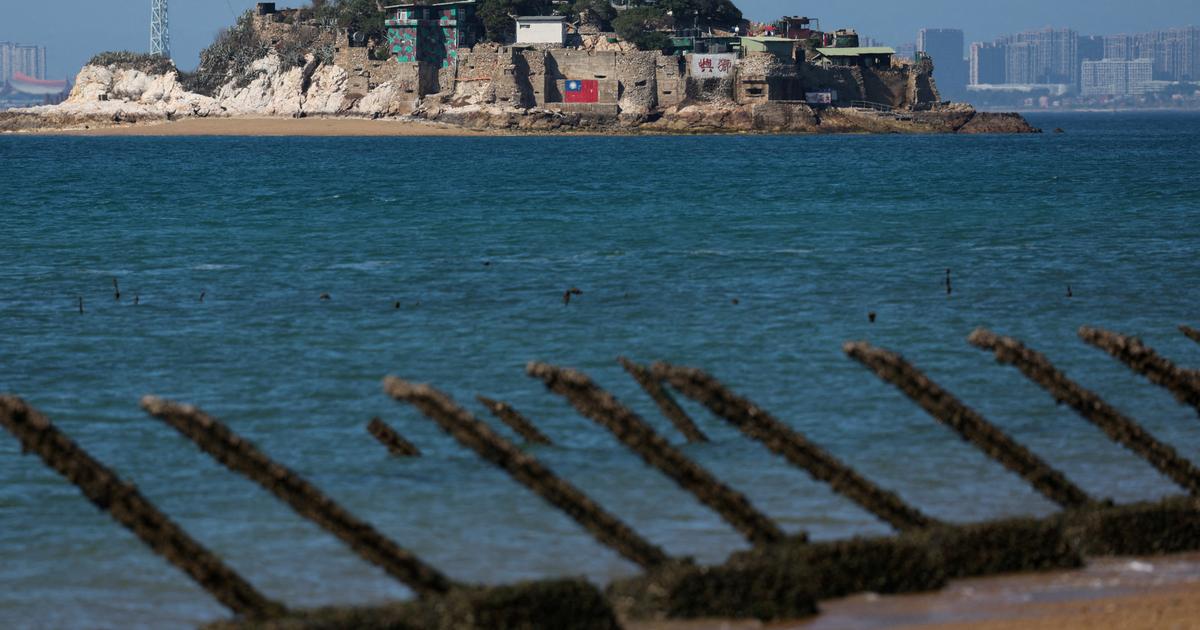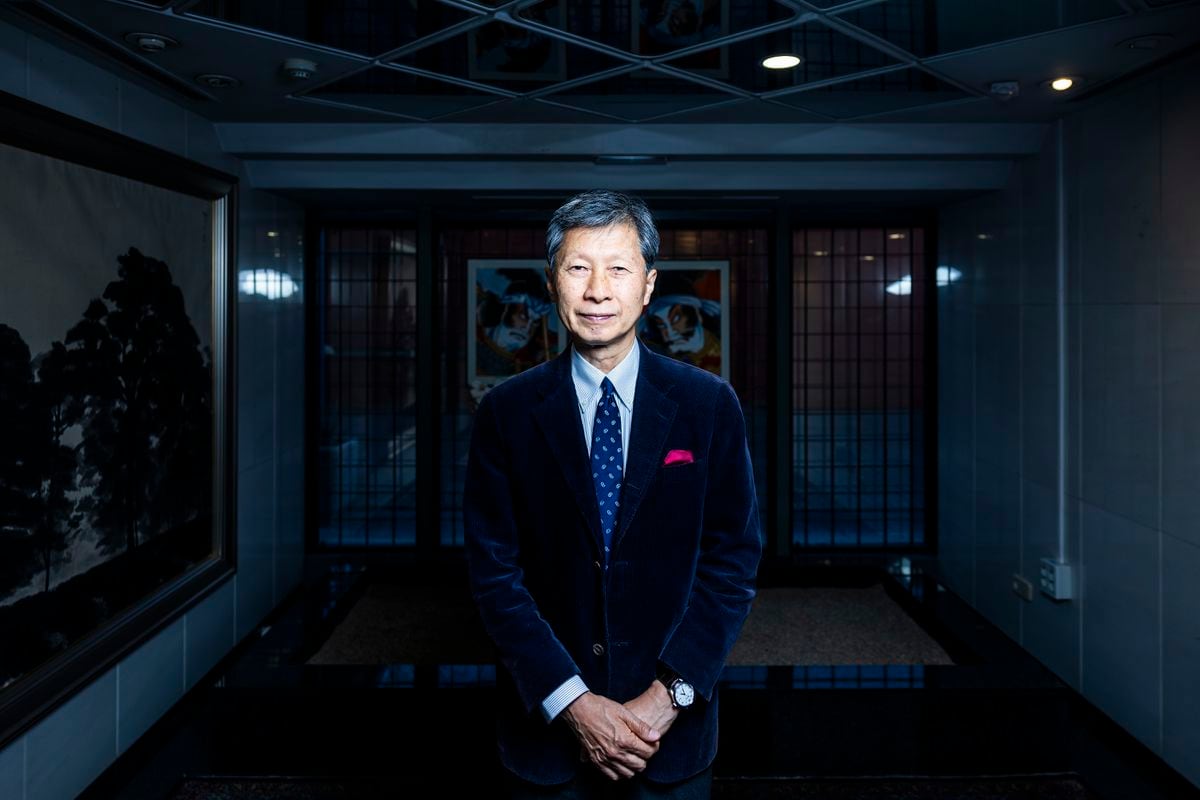China is stepping up its threats towards Taiwan.
We explain what the conflict is about - and whether war is imminent.
Munich – Since the then chairwoman of the US House of Representatives, Nancy Pelosi, visited Taipei last August, military provocations from China have increased: Chinese fighter jets approach Taiwan almost every day, and warships repeatedly cross the unofficial border line between Taiwan and the People's Republic.
The situation recently escalated again after Taiwan President Tsai Ing-wen met with Pelosi's successor, Kevin McCarthy, in the United States.
For three days, Beijing held military drills around Taiwan, rehearsing sealing off the island and attacking "key targets" located there, China's People's Liberation Army said.
Is a war between China and Taiwan now looming?
And what is the conflict actually about?
We answer the most important questions.
How did the conflict between China and Taiwan arise?
In the 19th century, Taiwan came increasingly under the influence of China, which was then ruled by the Manchurian Qing dynasty.
After the Sino-Japanese War in 1895, the island became a Tokyo colony.
The Chinese Empire fell in 1911 and the Republic of China was founded a year later.
But the young country soon sank into a civil war in which the ruling nationalists (Kuomintang, KMT) fought against the communists under Mao Zedong.
During the Second World War, both made a temporary pact against Japan, but from 1945 hostilities broke out again.
Mao finally emerged victorious from the civil war with his CP in 1949 and proclaimed the People's Republic of China on October 1, 1949.
Taiwan became part of the Republic of China again in 1945 after Japan's defeat in World War II.
That's where the defeated nationalists and their supporters fled from the communists in 1949.
The Republic of China lived on in Taiwan;
KMT party leader and "generalissimo" Chiang Kai-shek ruled there with an iron fist.
It was his son Chiang Ching-kuo that slowly opened Taiwan to democracy in the 1980s.
Tsai Ing-wen is the country's fourth freely elected president.
China and Taiwan: That's what the conflict is about
China and Taiwan: That's what the conflict is about
Is Taiwan part of China?
For the communist-ruled People's Republic, it is clear: "Taiwan is part of China - that is an indisputable fact," according to a white paper from last year.
And, "Taiwan has belonged to China since ancient times." In fact, Taiwan only became a Chinese province in the 19th century.
The People's Republic of China, only founded in 1949, never even exercised control over Taiwan.
Today, Taiwan has its own democratically elected government, it has its own military, it issues its own passports - in short: Taiwan is de facto an independent state, even if it has never formally declared itself independent.
Officially, the government in Taipei still sees itself as the successor to the Republic of China, which was founded in 1912. Up until the 1970s, people even wanted to reconquer the communist-ruled mainland.
Taiwanese have long considered themselves independent.
A 2022 survey found that only 2.7 percent of respondents see themselves as Chinese.
61 percent identified themselves as Taiwanese, and 32.9 percent said they were both Chinese and Taiwanese.
A "reunification" with the autocratically governed China is unimaginable for most residents of the model democracy Taiwan.
Which States Recognize Taiwan?
Only 13 countries currently maintain diplomatic relations with Taiwan - which also means that they cannot maintain relations with the People's Republic due to the "one China principle" demanded by Beijing.
In the Pacific, Taiwan's allies include the Marshall Islands, Nauru, Palau and Tuvalu, in Africa Eswatini, in Central America Belize, Guatemala, Haiti, Paraguay, St. Kitts and Nevis, St. Lucia, St. Vincent and the Grenadines - and in Europe the Vatican.
In recent years, several states have changed sides and established relations with Beijing, most recently Honduras.
This is mostly based on economic considerations, but in some cases there is apparently also pressure from China.
The US has not maintained official relations with Taiwan since 1979, only recognizing the People's Republic diplomatically.
Germany also has no official relations with Taiwan, but emphasizes that the conflict with China must be resolved peacefully.
Until 1971, Taiwan represented all of the Chinese people at the United Nations.
Today, the People's Republic of China holds the seat in the UN, Taiwan is no longer represented.
Taiwan is also not a member of most international organizations.
A prominent exception is the World Trade Organization WTO.
Taiwan | Official: Republic of China (Zhonghua Minguo) |
|---|---|
Surface | 36,179 square kilometers |
population | approx. 23.5 million |
Language | Chinese |
Capital city | Taipei |
currency | Taiwan Dollar |
form of government and government | Semi-Presidential Republic |
president | Tsai Ing-wen |
How likely is a war over Taiwan?
For China's Communist Party, it is a "historic mission" to "reunite" Taiwan with the People's Republic.
Head of state and party leader Xi Jinping has made this clear again and again.
"We will continue to strive for peaceful reunification with the utmost sincerity and effort.
But we will never promise to renounce the use of force, and we reserve the option to take any necessary measures," Xi said at the October party congress.
It is unclear whether and when China will get serious and attack Taiwan.
A date repeatedly cited by observers is 2027, when the People's Liberation Army of China will mark the 100th anniversary of its founding.
By then, the modernization of the army initiated by Xi should be largely complete.
Others call the year 2049: 100 years after its founding, the People's Republic of China wants to be a world power - Xi speaks of the "resurgence of the Chinese nation".
One thing is clear: Should China prepare for a large-scale attack, the foreign secret services would probably discover signs of this months or even years beforehand.
What would happen if China attacked Taiwan now?
China is arming itself: this year the military budget of the People's Republic is to increase by 7.2 percent to the equivalent of 211 billion euros.
However, it is far from certain that China, with its roughly two million soldiers, would win a large-scale attack on small Taiwan with its just under 24 million inhabitants.
According to a simulation by the Center for International and Strategic Studies (CSIS) in Washington, China would lose a “conventional” invasion in the near future – provided the US and Japan intervened on the side of Taiwan, which is currently considered likely.
However, victory for Taiwan and its allies would come at a cost: “The United States and its allies are losing dozens of ships, hundreds of planes, and tens of thousands of military personnel.
Taiwan's economy would be devastated," the CSIS analysts said.
China would also have to cope with high losses.
Between the Chinese mainland and Taiwan lies the approximately 180-kilometer-wide Taiwan Strait.
Crossing them may not be easy for China's People's Liberation Army.
It would be much easier to attack one of the islands directly off China's coast first, such as Kinmen or Matsu.
Experts speak of a "salami tactic": Should China incorporate tiny Kinmen, the USA would hardly risk a war with Beijing.
China could then concentrate on the other Taiwanese islands.
How would the US and Japan react in the event of war?
Washington has committed to supporting the Taipei government with defensive weapons.
In addition, US President Joe Biden has repeatedly stated in recent months that the US would intervene directly militarily should a Chinese attack occur.
However, it is unclear whether Taiwan can rely on these assurances, although there is a bipartisan consensus in the US to support Taipei.
Whether Japan would also get involved directly in a military conflict between China, Taiwan and the USA is an open question.
However, most experts assume that Tokyo would at least allow the US to use the American military bases in the country.
Around 54,000 US troops are currently stationed in Japan, more than half of them on the island of Okinawa, not far from Taiwan.
Japan also recently announced a massive increase in its defense budget.
How is Taiwan arming itself against China's threats?
Taiwan is also arming itself in the face of the threat.
In recent years, the government in Taipei has repeatedly bought large and expensive weapon systems from the USA, such as warships and advanced F-16 fighter jets and M-1A2 Abrams tanks.
From 2024, conscripts will no longer only have to do four months, but a whole year of military service.
Many experts, including those from the United States, believe that Taiwan should prepare better for an "asymmetric fight" with China.
If China attacks the Taiwanese islands with warships, Taiwan does not need warships to defend itself - it needs a well-secured coast and missiles with which the attacker can be eliminated.
Like a porcupine with its quills, Taiwan must secure itself against the People's Republic - experts therefore recommend Taipei a "porcupine strategy".
What role does Taiwan play in the global economy?
Made in Taiwan – every child knew that in the 1980s.
At that time, cheap plastic products, such as toys, came onto the world market from Taiwan.
Today, however, the island stands for cutting-edge technology.
About 60 percent of all semiconductors produced worldwide come from Taiwanese companies such as TSMC and UMC.
In the case of particularly highly developed microchips, Taiwan's market share is even around 80 percent.
Nothing works today without chips.
The small components are in televisions, cell phones and electric cars.
A failure of Taiwan's chip production would bring many factories around the world to a standstill.
Some experts believe that China - which also depends on semiconductors made in Taiwan - would therefore refrain from a large-scale attack.
Because an open war could bring the extremely sensitive production to a standstill - and with it the global economy.
Rubric list picture: © Xinhua/Imago







/cloudfront-eu-central-1.images.arcpublishing.com/prisa/MOXXTLJT2Z6VEUX4YEOA3F4B2A.jpg)





